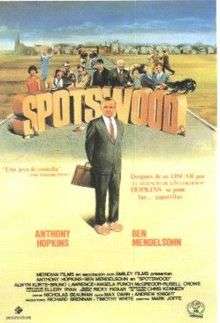Spotswood (film)
Spotswood is an Australian drama film directed by Mark Joffe, made in 1990-1991, released in 1992 in some locations; also known as The Efficiency Expert in the United States.
| Spotswood | |
|---|---|
 | |
| Directed by | Mark Joffe |
| Written by | Max Dann Andrew Knight |
| Starring | |
| Music by | Ricky Fataar |
| Edited by | Offshoot Films |
Production company | The Australian Film Commission, Australian Film Finance Corporation, Film Victoria, Meridian Films, Smiley Productions |
| Distributed by | Miramax |
Release date |
|
Running time | 95 minutes |
| Country | Australia |
| Language | English |
| Budget | A$3.4 million[1] |
| Box office | A$1,505,884 (Australia) |
Plot
In late 1960s Melbourne, Errol Wallace (Anthony Hopkins) is a financial business consultant whom we meet in the course of his being hired by the board of Durmack, an automotive component manufacturer, where he assesses a large work force redundancy and recommends major layoffs.
Balls, a moccasin factory located in the Melbourne suburb of Spotswood, is his next client. Mr. Ball (Alwyn Kurts), the owner of the company, is affable and treats his employees benevolently. Wallace on a factory tour finds the conditions wanting with shabbiness, old machinery and the workers lackadaisical.
A young worker at Balls, Carey (Ben Mendelsohn), who is finding his place in the world and life, is asked by Wallace to assist in his review, compiling worker condition and performance information. Carey is reluctant until he learns that Mr. Ball’s daughter Cheryl (Rebecca Rigg), whom he fancies, is part of the review staff.
Wallace learns that there is an instigator in the midst, his colleague Jerry (John Walton), who leaks the Durmack report, inflating the quantity of sackings as a means to demoralise the union.
Kim (Russell Crowe), a salesman at Balls who also has his sights set on the boss's daughter, shows his ruthlessness and ulterior motives when he comes to Wallace's home one night with a complete set of the company financial records that detail non-existent profit for years and reveal that Ball has been selling off company assets to keep the outfit afloat.
Wallace realises that whatever productivity improvements have been implemented are not enough to save the company even with an elimination of workers and yet that is his recommendation. Mr. Ball responds, "It’s not just about dollars and cents. It’s about dignity, treating people with respect.”
Wallace's mind set starts to change when his car is vandalised and some Ball workers come to his aid, workers who then start to include him in their off-hours activities. Mr. Ball announces the work force redundancies and Wallace is clearly uncomfortable seeing them, knowing that it was his recommendation that sealed their fate.
The union at Durmack capitulates and management celebrates with a party at which Wallace becomes disenchanted by rash sackings and realises that product diversity can potentially make the company profitable since the skills set is in the workers.
Carey realises he has feelings for his work mate and friend Wendy (Toni Collette) and together they climb up onto the roof of the factory and hold hands as they look out over Spotswood.
Cast
- Anthony Hopkins (Errol Wallace)
- Ben Mendelsohn (Carey)
- Alwyn Kurts (Mr. Ball)
- Bruno Lawrence (Robert, Carey's Father)
- John Walton (Jerry Finn)
- Rebecca Rigg (Cheryl Ball)
- Toni Collette (Wendy Robinson)
- Russell Crowe (Kim Barry)
- Angela Punch McGregor (Caroline Wallace)
- Daniel Wyllie (Frank Fletcher)
- John Flaus (Gordon)
- Gary Adams (Kevin)
- Jeff Truman (Ron)
- Toni Lamond (Mrs. Lorna Ball)
- Jill Murray (Ophelia, Carey's Mum; as Jillian Murray)
- Lesley Baker (Gwen, Carey's aunt as Leslie Baker)
Box office
Spotswood grossed $1,505,884 at the box office in Australia,[2] which is equivalent to $2,348,887 in 2009 dollars.
See also
References
- Andrew L. Urban, "Anthony Hopkins", Cinema Papers, May 1991 p8-10
- Film Victoria – Australian Films at the Australian Box Office